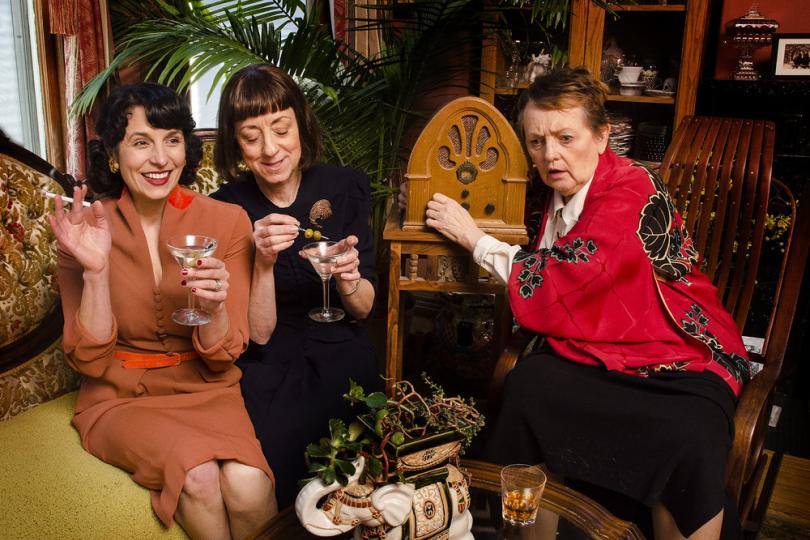Historically inaccurate, yet vitally important

Prime Production is one of the newest theater companies in town, seeking, as their website states, to “explore, illuminate, and support women over fifty and their stories through the creative voice of performance.” Looking for more diversity of storytelling work that create more outlets for all women to share their stories (especially in theater, where women over fifty can find it difficult to find a role) I eagerly awaited their first full production, Steven Carl McCasland’s Little Wars.
Set in Gertrude Stein and Alice Toklas’s Parisian salon in the beginning of WWII, the play introduces us to a group of writers (Lillian Hellman, Dorothy Parker, and Agatha Christie) visiting the book-cluttered and art-filled home to discuss writing. Among them is Bernadette, a German Jew in hiding and Muriel Gardiner, a political activist who has come in search of funds in order to help Jews escape from Germany. Full of strong characters and stronger opinions, I was swept away by the whiskey-drinking, swearing women who strode through sexual norms, issues of relationships and divorce, and politics with broad strides and strong words.
Seeing a space that reminded me of my own with books piled precariously, walls filled with bright images and literature references while the women my friends and I might hope to be in thirty years discussed intellectual and personal topics struck me as something a bit different. I don’t recall seeing an entire cast of women, a majority of them over the age of forty, onstage before, let alone a show that featured them and gave them more to talk about than just love and growing old. This play celebrates women in all of their complexities and allows them to argue and drink in ways that is too often only written for men. As a whiskey-drinking, swearing LGBT writer who spends a great deal of her time discussing politics, the characters and issues at stake hit a personal tone for me.
The politics of the piece also feel timely (unfortunately) as discussions of fascism are only on the rise. “I won’t let it happen again, Bernadette,” Gertrude promises her maid, echoing a promise I hear uttered again and again. In the play, this involves not just the rise of Nazis but also sexual violence. “We waste so much time with silence,” Muriel tells us towards end of the show. What is perhaps most compelling is the need and desire thes women find to do something, to have their own resistance to the world around them that reaches beyond their salon, where they can discuss things in safety and privacy. For Lillian Hellman, it becomes more than just donating but actually getting involved in acts of resistance. Given our time and place, it’s an important message we all need to hear.
There is a caveat to this. As Kit Bix discusses on Talking Broadway and Matthew Everett alludes in his review, the historical accuracy of this play is highly questionable. Unfortunately, it seems that Gertrude Stein most likely did not support the resistance of Nazis – in fact, is seems she supported the Vichy government (as discussed in this New Yorker article). Though I certainly don’t expect plays to be entirely accurate in terms of history, I do like to know when things stray from the truth or when liberties have been taken. Since the play focuses so much on who will tell their stories, especially Bernadette’s speech at the beginning and at the end, it comes as a bit of a shock to know that play is far more fictitious than it seems.
As a dramaturg, I find these historical perspectives important and wish they had been dealt with in some way – a statement in the program, a resource guide, etc. As Prime is a new company, I hope that future productions will work to include this research when it is necessary. While these uneasy historical lessons do change how I relate to the show, I still find myself blown away by the representation of women in this piece. The moments of intersectionality – between gender and sexuality, age and gender, and politics and gender – are moments of vital connection to me.
I look forward to seeing more of these intersections (with race, class, etc) in the future work that Prime has planned. I hope I continue to see more and more diverse representation of women, not just in this theater company, but in all companies.




